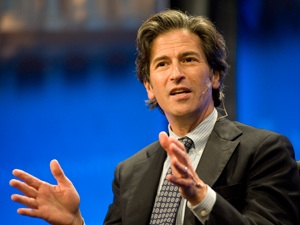 On November 6, right after California's gubernatorial election, FWSF had an engaging conversation about fixing California's government with David Crane, SIEPR Research Scholar at Stanford University and Former Economic Advisor to Governor Schwarzenegger. David is also President of Govern for California, an organization supporting courageous, honest and effective state legislators who put the interests of their fellow citizens ahead of personal, party or special interests.
On November 6, right after California's gubernatorial election, FWSF had an engaging conversation about fixing California's government with David Crane, SIEPR Research Scholar at Stanford University and Former Economic Advisor to Governor Schwarzenegger. David is also President of Govern for California, an organization supporting courageous, honest and effective state legislators who put the interests of their fellow citizens ahead of personal, party or special interests.
David highlighted that the lives of 40 million Californians are affected by state legislators more than by any other officials, including Congressman and the President. A tiny number of elected officials write thousands of laws and spend billions of dollars. For example, this year, the governor and 120 state legislators will spend $240 billion if the proposed budget is adopted, educate 9 million students, write laws affecting 18.7 million workers and job seekers, incarcerate 187,000 prisoners, build and maintain roads, railways, parks and levees, determine outlays for health, universities, courts, parks, the environment and welfare, consider 5,000 bills and pass 1,000, and much more.
David emphasized that although governors get all the attention, legislators have the co-equal power and too many of those legislators are owned by special interests. A governor can stop things but can’t get anything done without the Legislature; for example, in order to pass a tax increase, at least 91 legislators have to agree. Government is not like business and governors are not like CEOs; they can’t hire and fire people. Even though there are only 120 California state legislators, few Californians know the names of their representatives, much less how those legislators vote or the alliances they keep.
In the United States, it is the state, not the federal government that provides domestic services to citizens including public education, public transportation, public health, public infrastructure, public safety, parks, most of the court system, and more. That’s why there are nearly 20 million state and local employees as opposed to 4 million federal employees. States this year will spend $3.2 trillion, just 20 percent less than the federal government, and 60 to 80 percent of this amount will go to compensation and benefits of state and local employees, compared to less than 15 percent for federal employees.
David highlighted that it’s important to keep in mind that the government reports its balanced budget using cash-basis accounting, where revenue is recorded when cash is received, and expenses when they are paid in cash. This can be misleading; for example, benefits for prison guards reported as $6 billion would amount to $9 billion using the accrual method (when economic events are recognized regardless of when cash transactions occur).
Comparing the current budget with 2008, Dave stressed the importance that even though taxes and revenues went up, spending on most services – including universities, courts, welfare and parks – went down. Debt exploded (retirement debt rose by 150 percent), and today 25 percent of Californians live in poverty, the highest rate in the country. Those changes worked fine for government employees, tribes, corporate professionals and professional associations, but the average citizen lost out.
At the end, David highlighted two central points: 1) State legislators are key to addressing core fiscal and educational issues; 2) Individuals can play a big role in building California’s State Legislature. He concluded by quoting Thomas Jefferson: “We do not have government by the majority. We have government by the majority who participate.”
In the last 40 minutes there was a lively Q&A session where the attendees asked various questions about state reforms and legislators. From this Q&A we found out that:
For more information, we recommend David's opinion piece Tithing to Democracy. We were honored to have David as our guest speaker. We gained important knowledge about the governance of California and left the event full of thoughts about how we can fix our state!